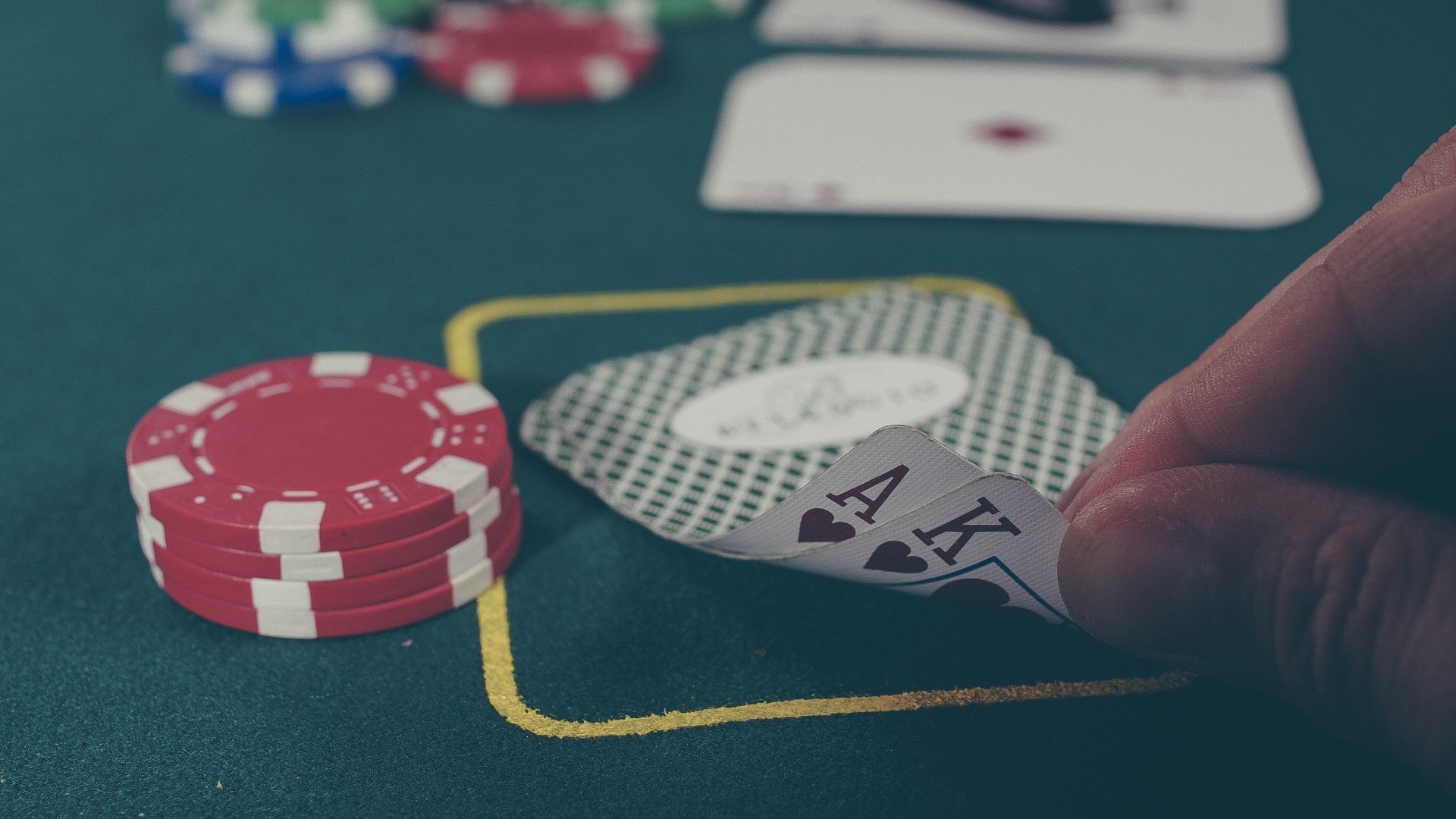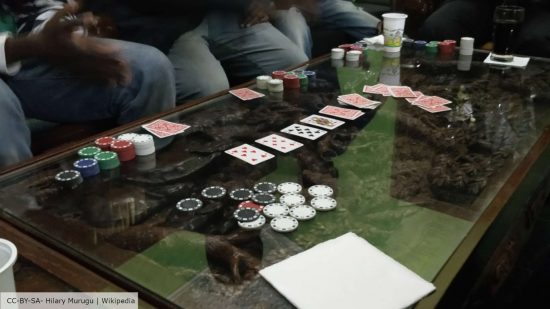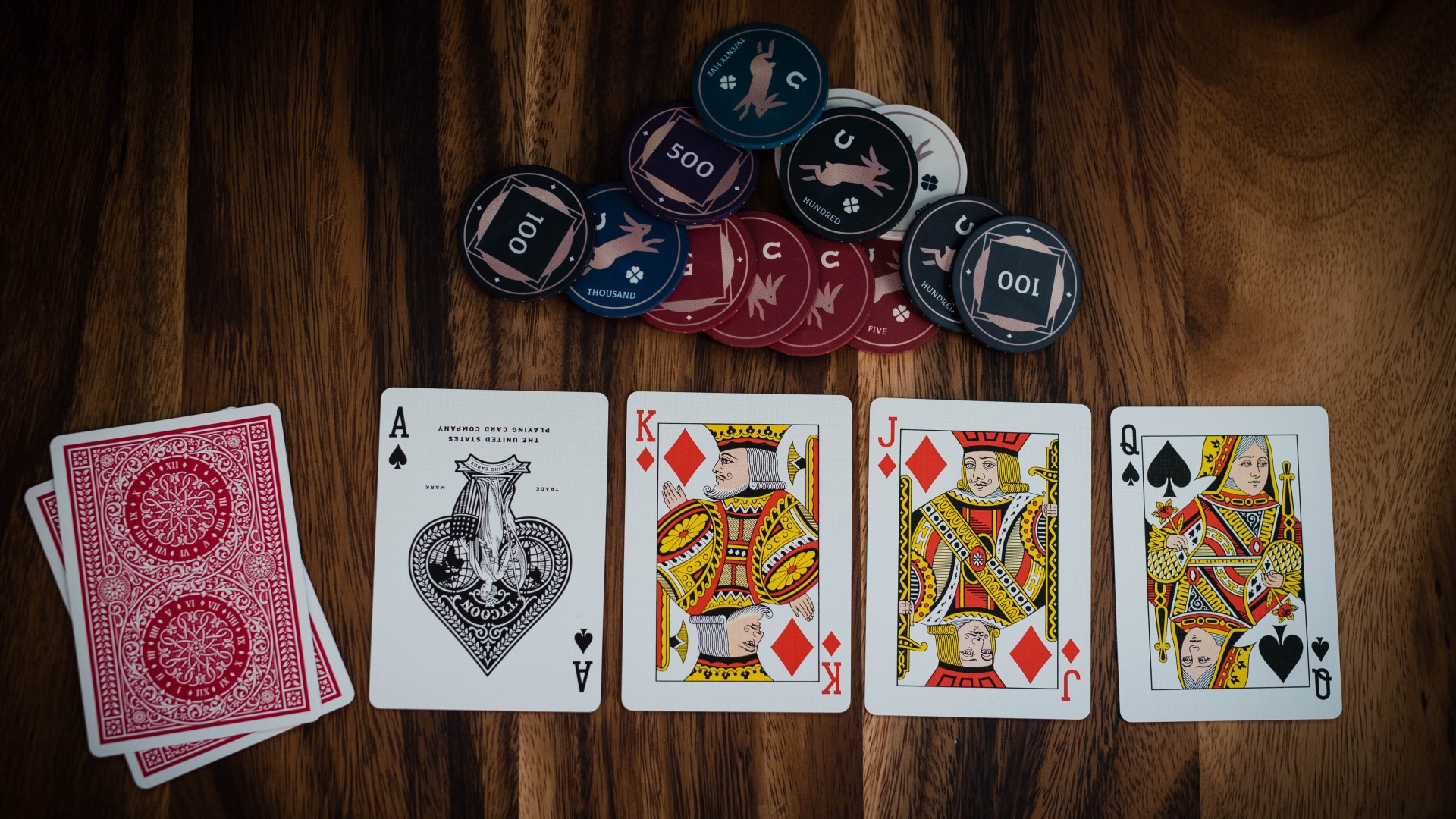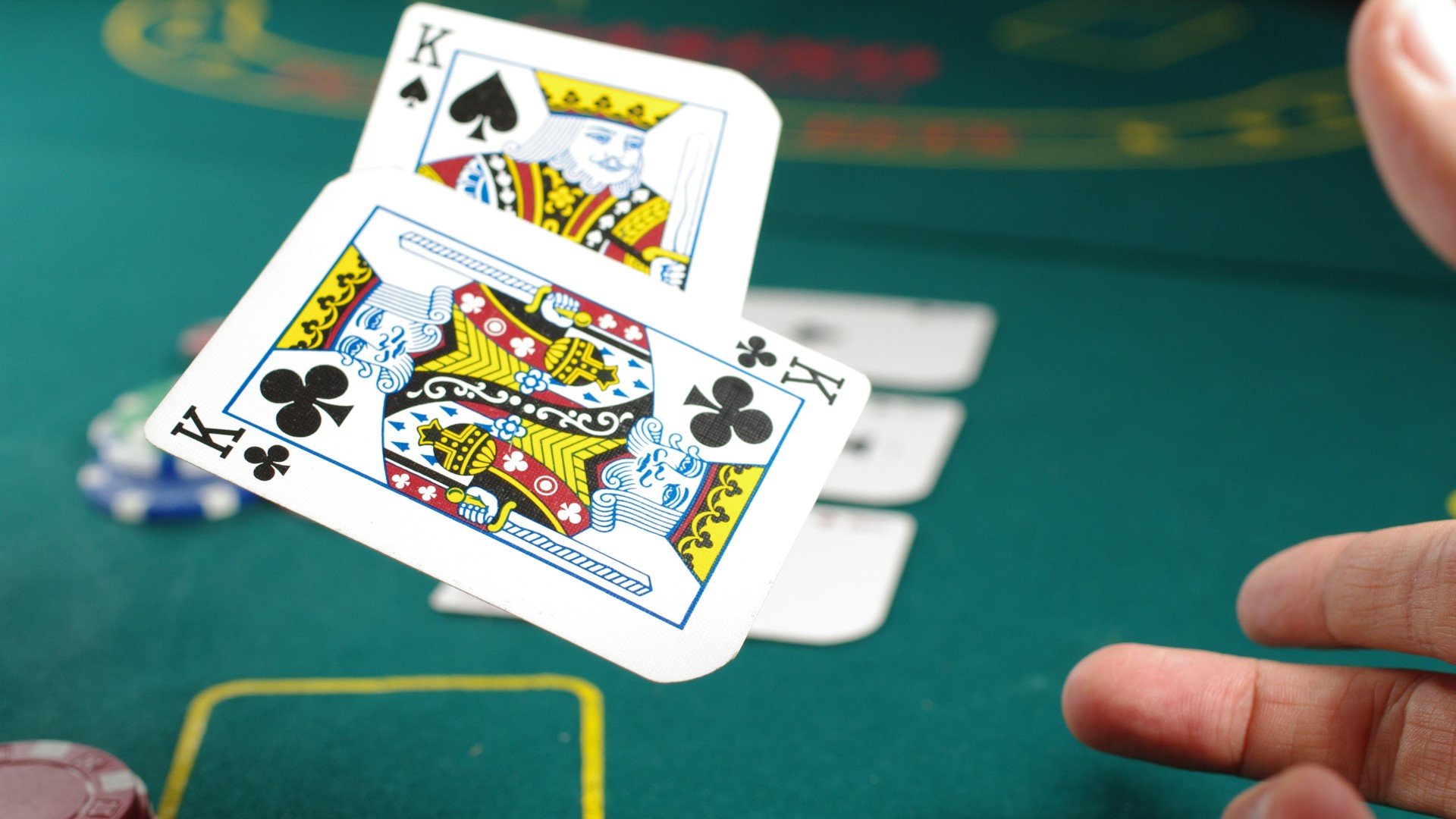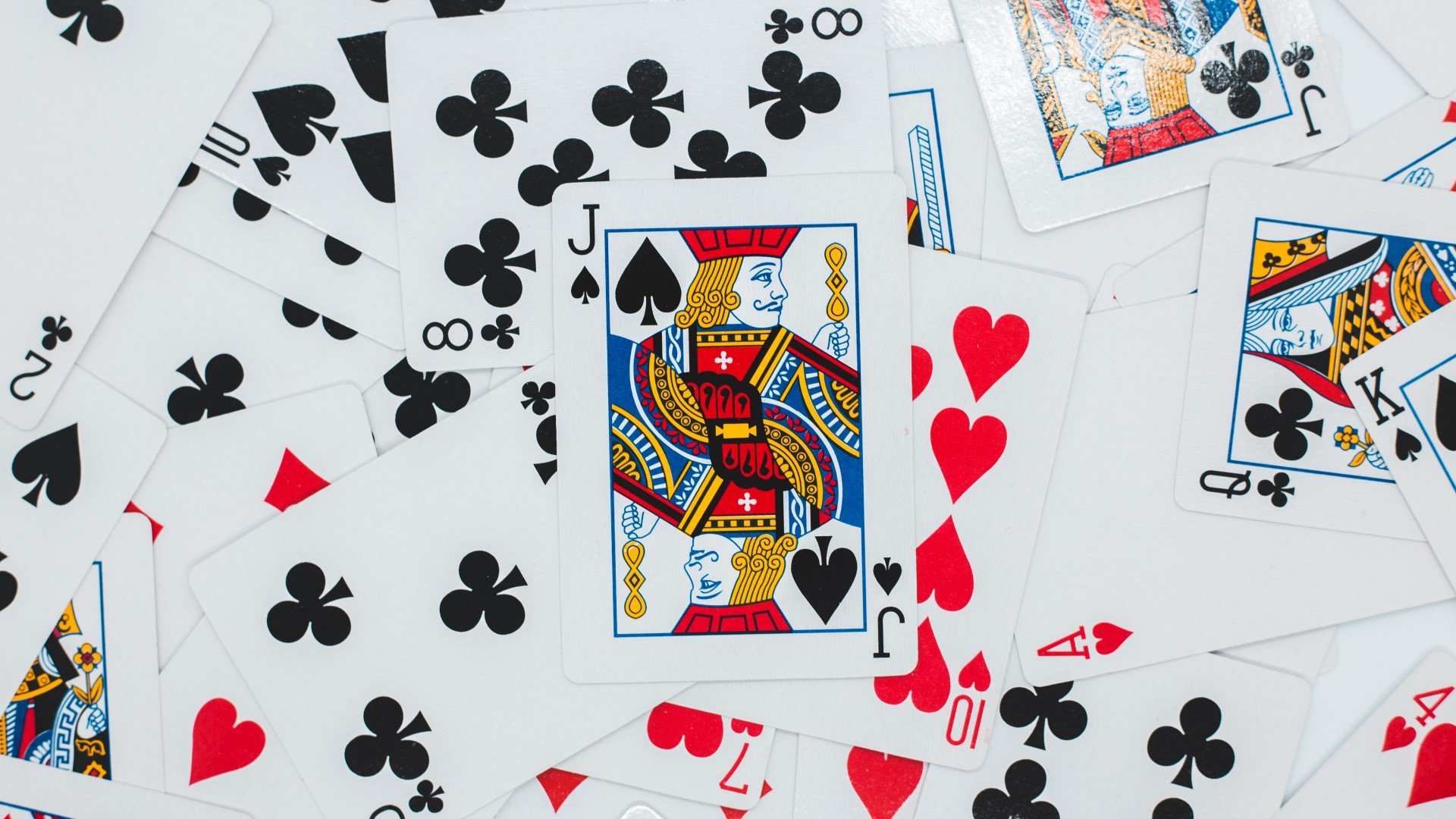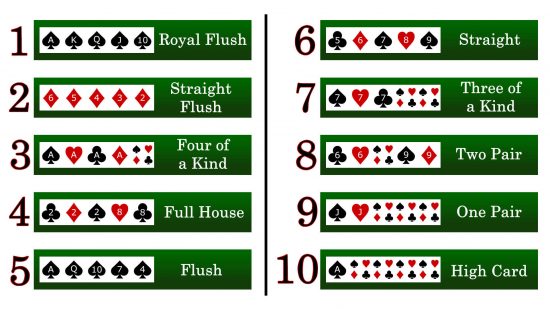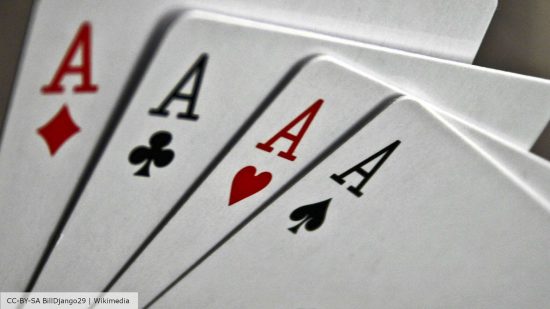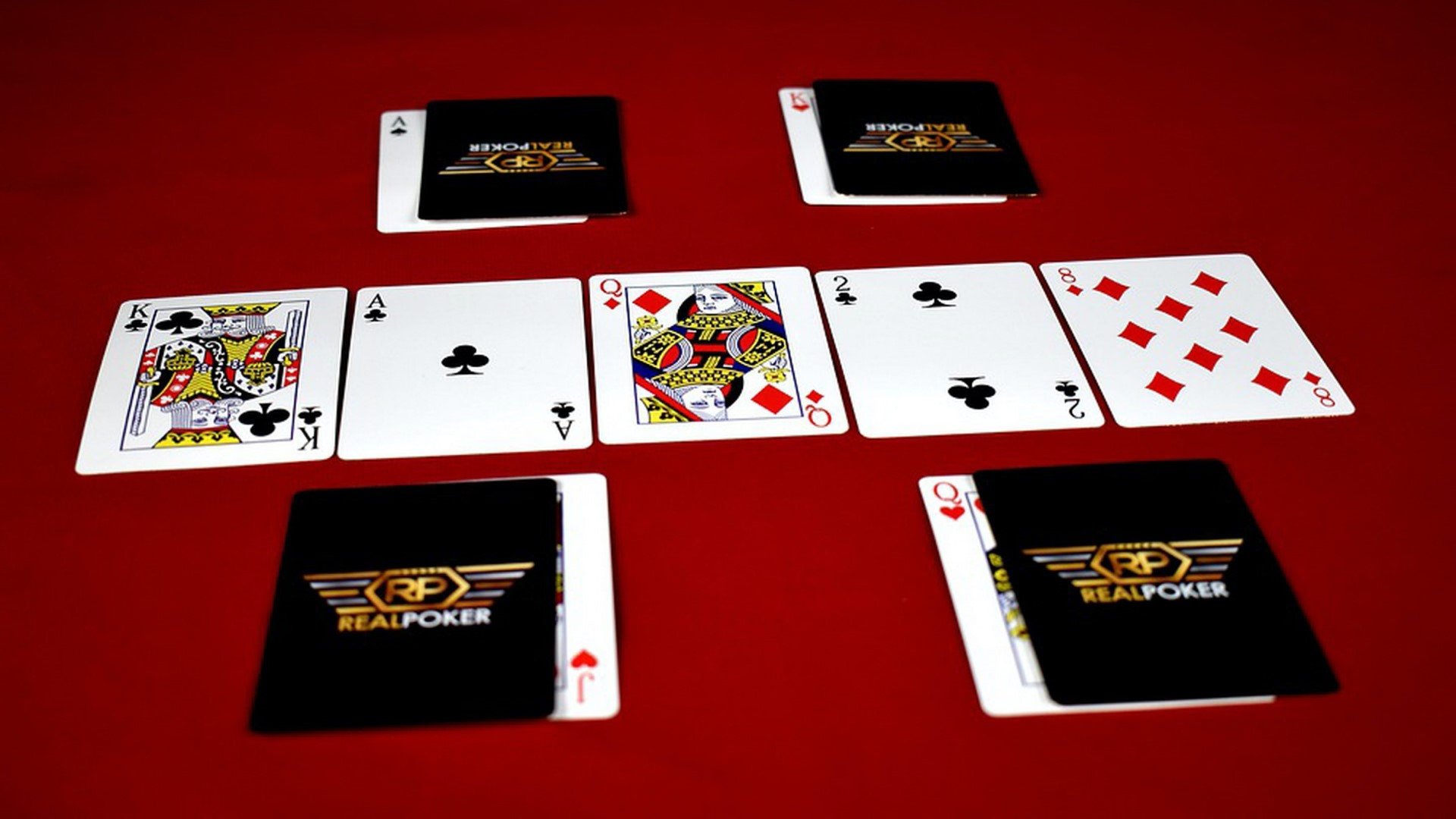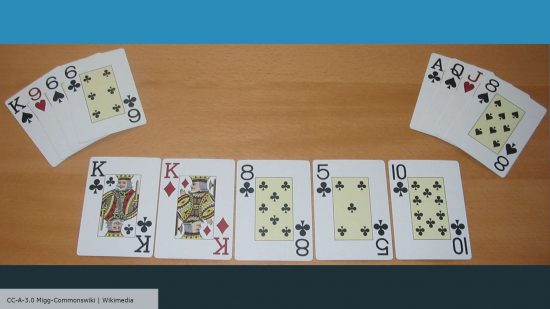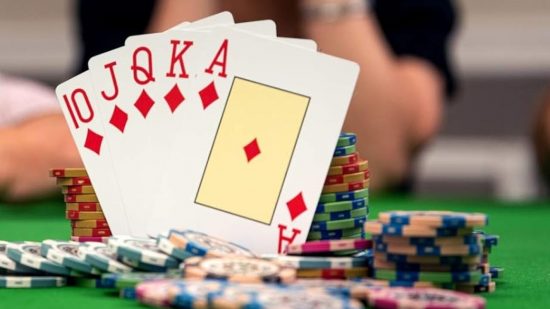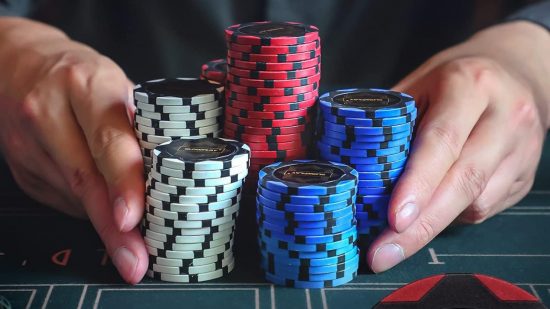If you want to learn how to play poker, good news – the basic poker rules are surprisingly simple. You don’t have to sneak into a casino to learn the ways of this extremely popular bluffing game. We can teach you all you need to know about rules, hand values, bets, and more in this handy guide to the basics of Poker.
This guide focuses mostly on Texas Hold’em, the most popular variant of the playing card game, but most of the core rules are shared with other versions of poker. We’ve included introductions to Omaha poker, Omaha hi-lo, and Mississippi stud as well, so you’ve got plenty of bluffing card games to practice your poker face with.
We also have a separate, detailed guide that’ll teach you the value of different poker hand rankings. We recommend learning poker with some friends or on free card games online, in which no real-world money is involved. Playing poker for pennies or match-sticks is still fun, and will teach you the core of the game before you learn the extra layer of skills needed to play one of the best card games professionally.
This is how to play Poker:
- Poker rules
- Poker hand rankings
- Tournament vs cash poker
- Poker bluffing
- Short deck poker rules
- Omaha poker rules
- Mississippi stud poker rules
- Other poker variations
- Is it legal to run a poker game?
- Poker strategy tips
Poker rules
The poker rules are simple. At its heart, poker is a game of bluffing, betting, and building. You’ll try to construct specific card combinations (called hands) that outrank your opponents’, while keeping your cards close to your chest and bluffing about the strength of your hand to trick the other players, maximizing your chance of claiming the betting pot.
After several rounds of betting, raising, and card dealing, if you’re the last player left in the game, or have the strongest hand out of every player left, you’ll take all the winnings for yourself.
Poker games are split into a series of rounds, in which a pair of cards are dealt to each player, several more cards are dealt in a pool on the table, and players are given opportunities to raise their bets or bluff their way to victory.
Before you start playing, however, make sure you have the right number of players. Games of poker generally find their sweet spot at six to eight players, although higher and lower player counts aren’t unheard of.
As well as the players, one person should also be the dealer, responsible for dishing out the cards. In casual circles, players usually take turns dealing, passing a ‘dealer’ token around the table.
Alongside the dealer, two more roles are assigned to the players: ‘small blind’ and ‘big blind’. These players have to make blind bets before any cards are drawn, ensuring that there’s a pot to bet for every round. The blinds also drain player funds, encouraging them to bet even when faced with a bad hand.
After a full match is played, the dealer, small blind and big blinds rotate clockwise around the table.
Poker rounds
- The player to the left of the dealer is assigned the small blind, and must bet half the usual minimum bet.
- The player to the left of them is assigned the big blind, and must make the minimum bet.
- Each player receives two cards dealt face down. These are called the ‘hole cards’.
- First round of betting.
- Flop: the dealer places three cards face up in the middle of the table.
- These are called the ‘community cards’.
- Second round of betting.
- Fourth Street: The dealer adds a fourth, face-up card to the community cards.
- Third round of betting.
- River: The dealer adds the fifth, and final card to the community.
- Final round of betting.
- Showdown: All remaining players turn over their cards. The player with the highest hand takes the pot.
Poker betting options
In each round of betting, players have several options available to them. You might base your betting decision on how confident you are in your own hand, as well as how confident you are of your opponents’. The player to the left of the big blind acts first.
| Choice | Effect |
| Call | Make a bet equal to the current highest bet |
| Raise | Make a bet larger than the previous bet |
| Fold | Withdraw from the match, surrendering your hand and any bets you’ve previously made. |
| Check | Decline to bet, but reserve the right to call or raise later in the round. This option is only available until the first bet in a round has been made. |
| All in | Bet all of your remaining chips. If you can’t call a bet, you can still go all in to remain in the match. |
If there’s a raise, betting continues counter-clockwise, giving players the chance to call, or raise again. Betting continues until every player has called or gone all in.
Calling means adding money up to the amount of the most recent bet, not equal to the most recent bet. Suppose you’re playing poker for dimes at home, with the minimum bet set at $0.20. You’re the small blind for the round, so you’ve put a dime into the pot.
The first player raises the bet to $0.40. When betting comes round to you, you can call by increasing your bet up to $0.40, putting an extra $0.30 into the pot; or raise to $0.60, putting $0.50 into the pot.
Betting limits
In many games of poker, particularly those played in casinos, limits are imposed on the size of bets players can legally make. These limits take three main forms:
| Limit | Effect |
| Fixed limit | Players can only raise by fixed amounts. This prevents huge bets being made to massively increase the pot. |
| Pot limit | Players may only raise by an amount that’s less than or equal than the total pot. Again, this prevents huge bets, but gives more leeway. |
| No limit | Players can raise as much as they like. |
Poker hand rankings
In the showdown, the final round of the game, all remaining players will compare their Poker hands to determine which of them has won. All players simultaneously reveal their cards, before assessing which of them can create the strongest hand using their hole cards and the community cards in the center of the table.
Poker hands consist of five cards, and are ranked according to their relative strength. These are the poker hand rankings from highest to lowest.
| Rank | Name | Hand |
| 1 | Royal flush | 10, J, Q, K, A, all in one suit |
| 2 | Straight flush | Five consecutive cards, all in the same suit |
| 3 | Four of a kind | Four cards of the same card value (e.g. four Threes) |
| 4 | Full house | One pair and one three of a kind |
| 5 | Flush | Five cards all in the same suit |
| 6 | Straight | Five consecutive cards |
| 7 | Three of a kind | Three cards of the same card value |
| 8 | Two pair | Two different pairs |
| 9 | Pair | Two cards of the same card value |
| 10 | High card | If there’s no higher scoring hand, the highest card wins |
For a more detailed rundown, read our poker hand rankings guide, in which we walk you through exactly what makes up each hand, and the most common ways that ties are decided.
Tournament vs Cash poker
Though the core rules of poker are the same whether you’re playing tournament or cash poker, the format you play in does affect the game.
| Factor | Cash games | Tournament |
| Timing | Enter and leave games as you please | Fixed duration, enforced by the blind structure |
| Blinds | Fixed | Increase over time following a set pattern, ramping up the size of minimum bets |
| Chips | Have a direct money value | Have an arbitrary value |
| Winnings | Whatever profit you make from bets | Prize pot awarded for high tournament placement |
| Antes | Uncommon in Texas Hold’em | A minimum forced bet for all players, which may increase over time |
The differences between Cash and Tournament games don’t affect what is a good or bad hand, but they do affect how you should bet. Increasingly large blinds and antes will drain chips from players who fold early, encouraging you to keep weaker hands and take bigger risks. There’s no way to ‘quit when you’re ahead’ in a Tournament: the only way to cash out is to win overall.
Poker bluffing
Poker is a game of bluffing as well as judicious betting. If you have a weak hand, you don’t have to fold if you can trick your opponents into folding instead. If you can hide a strong hand, you can lure opponents into making incautious raises, increasing the pot.
If you’re playing social poker with friends you’ll have a better read on people’s tells and their psychology. Casino games are much more difficult as you’ll have only a limited amount of time to observe each participant’s behavior.
You can’t win through bluffing alone: playing a weak hand is a risk, and if an opponent senses that you’re taking risks, they can be more confident raising aggressively when holding a strong hand.
If you’re in either of the blind seats, you’re committed to betting on a hand whether or not it’s any good. Particularly in the later rounds of tournament poker, this is a big incentive for you to play weak hands: remember that your opponents know this when you try to bluff them.
Short deck poker rules
Short deck poker is a variant of Texas Hold’em that uses a reduced deck with just 36 cards, rather than the full 52. The deck uses the Ace, number cards six through 10, and Face cards, while the number cards two, three, four, and five sit on the sidelines. The Ace can still be used as a high or low card, counting as a five when played low.
Removing so many number cards from the deck changes the probability of creating certain hands, so the ranking of hands changes accordingly: Three of a Kind ranks higher than a Straight and Flush ranks higher than Full House.
Omaha Poker rules
There are several Poker variants called ‘Omaha’. In general, Omaha Poker rules are very similar to Texas Hold’em – it’s in the same family of Poker games, called ‘Community poker’. Under Omaha rules, players are dealt four hole cards, instead of two as in Texas Hold’em, and must construct their final poker hand using exactly two of these cards plus three of the five community cards.
A common sub-variant of Omaha Poker is Omaha hi-lo, or Omaha 8-or-better. In this version, each player is trying to make two hands from their four hole cards, a high hand and a low hand. The pot gets split between the players who win high and win low. The “8 or better” in the name comes from a stipulation on the players low hand – for it to qualify, it needs to be an 8-7-6-5-4 or lower.

Mississippi Stud Poker rules
Mississippi Stud Poker is played against the house, not against the table – no matter how many people are at the table, all that matters is the strength of your hand – it’s like Blackjack in that regard, but it has slightly less advantage for the house. A fixed pay table determines what a given hand will win, if anything.
After paying an ante to enter the game, you’re dealt a pair of cards. Once all players are in, the dealer will lay out three community cards face down. They will then flip the first card.
At this stage you can either fold, or bet one to three times your ante. You’ll have the option to fold or bet for each of the subsequent cards. If you fold you’ll lose all your bets. At the end of the game, the strength of your hand will determine whether you get any payout, which will be a multiple of your bet.
| Hand | Result |
| Worse than a pair of 6’s | Loss |
| Pair of 6s, 7s, 8s, 9s, or 10s | Push (bet returned) |
| Pair of face cards | 1x bet |
| Two pairs | 2x bet |
| Three of a kind | 3x bet |
| Straight | 4x bet |
| Flush | 6x bet |
| Full House | 10x bet |
| Four of a Kind | 40x bet |
| Straight Flush | 100x bet |
| Royal Flush | 500x bet |
It’s a very straightforward game, but not suited for home games, as there’s no bluffing or interaction.
Other poker variations
Not all games of poker play the same. While we’ve laid out the basics of Texas Hold’em here, there are plenty of other poker variations that introduce subtle rule changes. Variations might include the size of the deck, the value of certain hands, the number of betting rounds, whether community cards are present; here’s some of the more popular variations:
Stud poker
In stud poker players are dealt a combination of face-up and face-down cards between betting rounds. This provides more information to the opposing players, and removes all shared community cards. Six-card stud and seven-card stud are common variants.
Stud poker variants include:
- High-low stud; the pot is split between the player with the highest hand and the player with the lowest.
- Mexican stud; a variant of five-card stud which often uses a stripped back deck and wildcards.
- Caribbean stud; similar to five-card stud, but each player is also playing against the dealer.
Draw poker
In draw poker, players are dealt a complete hand before the first betting round begins. Each player develops their hand in later rounds by drawing replacement cards, trying to curate the highest-ranking hand possible.
Community card poker
The most popular form of poker, this is the category that Texas Hold’em falls into. This variant involves a number of face-up cards being dealt in the center of the table – the community cards – which every player can use to form their hand.
Is it legal to run a poker game?
Whether or not it is legal to run a poker game with real money depends on your local legal system. In some territories all forms of gambling for money are illegal, and there is no way to operate any form of poker game legally.
In the United States, each state sets its own law about the age at which one can gamble and whether or not its legal to play poker in an unlicensed venue. Each state’s gambling commission issues licenses for poker venues and tournaments.

Poker strategy tips
Need some beginner Poker strategy tips? Here are some that are easy to remember:
Play aggressively
Playing too cautiously has a lot of disadvantages in Poker. Firstly, it makes you look like a weak player at the table, and your opponents may work to push you out of the pot (something you can do to them with aggressive plays). Secondly, you miss 100% of the shots you don’t take – if your hand seems strong, chances are you should be betting on it.
Fold more hands than you play
An aggressive play style doesn’t mean you need to bet with every hand you’re dealt. In fact, strong poker players tend to fold more hands than they play. Obviously weak hands aren’t worth playing, and holding back gives you a chance to observe your opponents while they bet. You can learn a lot about how they play in these moments.
Start with semi-bluffs
Bluffing is a big part of poker, but it takes practice to master at. When you’re just starting out, avoid bluffing too often on a terrible hand. Instead, look for opportunities where ‘semi-bluffs’ are possible.
A semi-bluff hand might not win you a showdown at first, but it has the potential to improve as rounds of betting go on. Maybe the right card can turn it into a flush or a straight, for example.
Looking for more card games for adults? Trading card games are a great way to scratch that itch – here’s how to play Magic: The Gathering, for example.

